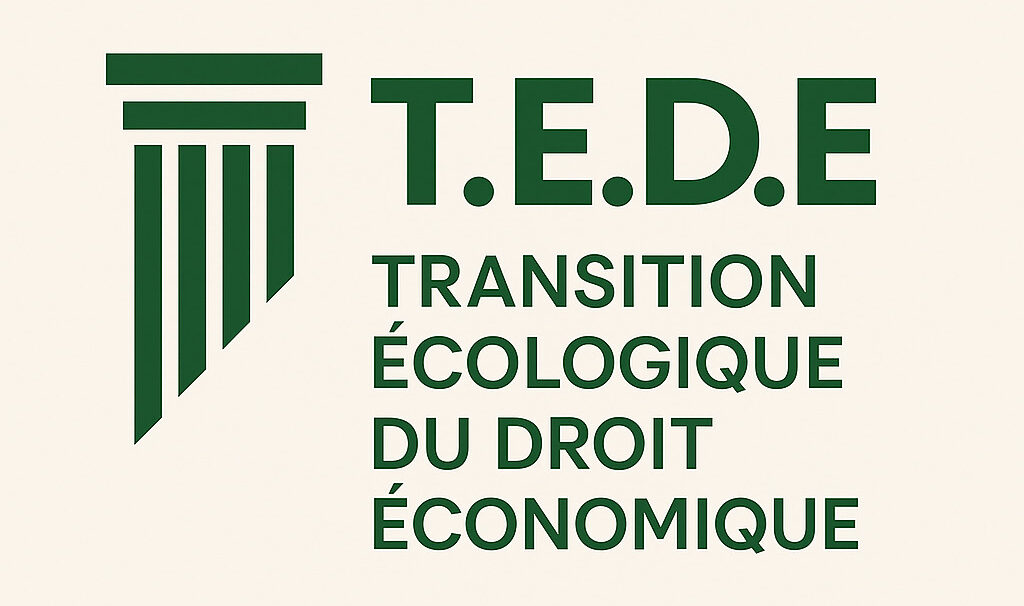In English
About the Research Project
« Ecological Transition of Economic Law » is a collaborative research project co-directed by Prof. Aude-Solveig Epstein (Paris Nanterre University School of Law and NYU Abu Dhabi), Prof. Gilles J. Martin (University of Côte d’Azur, Law School) and Prof. Marie-Alice Chardeaux (Université de Paris-Est Créteil, Law School).
It pursues the following objectives:
• Uncover the legal foundations for the ecological turn of economic law
• Identify legal pathways to harmonize corporate governance with sustainability targets
• Revisit economic law methodologies that conflict with the needs of sustainability policies
• Promote the integration of sustainability issues into the teaching of economic law
• Bring together a community of researchers addressing topics at the intersection of economic law and environmental law from a critical and transdisciplinary perspective, integrating both theory and field-work
The research team regularly organizes public events and publications on the ecological transformation of economic law.
Research Context
Policymakers and academics have traditionally portrayed economic law and environmental law as distinct and even self-contained legal disciplines. This framing of their separation typically serves two primary objectives.
The first goal is to isolate market activities from government policies—whether economic, social, or environmental. This strict separation has driven a series of reforms, spanning from the 19th century to the present, that have promoted industrialization and economic globalization. One significant reform has been the legal status of large corporations, which, in the latter half of the 19th century, came to embody the doctrine that corporations should benefit from a legal status modelled on aspects of natural personhood, and be shielded from state efforts to regulate their conduct and curtail their influence. Another major wave of reforms came with the transfer of market regulatory powers from elected governments to independent administrations. In establishing such a transfer in regulatory powers, governments expressed the view that market regulation would thus be insulated from Government pressure, and therefore be politically neutral and economically efficient. Once implemented, these reforms reinforced the political notion that laws governing corporations and markets should focus primarily on ensuring free competition as a means to foster economic growth.
The strict separation between economic and environmental law has also been instrumental in establishing the legitimacy of environmental law. Until the 1970s, much of the regulation that we retrospectively label as « environmental » actually fit the definition of economic law. For instance, the primary intent of most of the air quality regulations enacted since the 19th century was to make the risks caused by industrialization socially tolerable and to limit the cost of environmental damage – to the same extent, perhaps even less, than the preservation of ecosystems or public health. However, from the 1960s-1970s, a new policy discourse emerged to describe environmental law. Environmental law came to be described as a law intended “for” the environment, meaning a law primarily pursuing environmental protection by subjecting corporations to ecological constraints.
The supposed dichotomy between economic and environmental law has flourished since the 1970s, seemingly drawing coherence from the neoclassical school of economic thought. In this framework, economic law is envisioned to regulate corporations and markets to foster growth and prosperity, while environmental law is tasked with mitigating the negative environmental externalities arising from their activities. The design of law school curricula, modelled on this perceived dichotomy, has further entrenched mutual ignorance between specialists in economic law and environmental law. One important consequence of this compartmentalization between the two disciplines has been the development of economic rules that resist the integration of environmental issues. Similarly, environmental legislation remains disconnected from the reality of economic affairs.
However, this supposed dichotomy does not hold in real life, primarily because the creation and enforcement of environmental law have largely been shaped by compromises between environmental protection and economic interests, with the latter often dominating. Rather than a true dichotomy, there exists an imbalance, where environmental law incorporates economic considerations to a broad extent, while economic law disregards environmental concerns.
Over time, the distinction between economic law and environmental law has become increasingly blurred. While business law was still regarded in 2016 as one of the legal fields most resistant to environmental influence, the post-COVID era has seen heightened debate over the role of business law and economic regulations – such as property law, corporate law, contract law, free trade agreements, investment treaties, prudential rules, and financial regulation – in driving the transition to sustainability. Recently enacted economic and financial laws and regulations increasingly consider environmental targets as inherent objectives. The mandate of economic regulators evolves accordingly to reflect these changes. These developments led analysts to predict that economic law would enter a new age: after concentration, globalization, and digitalization, « [t]here is a fourth age emerging through the ecologization movement. » (J.-B. Racine, « Introduction », in J.-B. Racine (dir.), Le Droit économique au 21e siècle : notions et enjeux, LGDJ, 2020).
In this context, advancing scholarship on the increasing integration of environmental goals into economic law is essential—this is precisely the aim of the TEDE research project.

